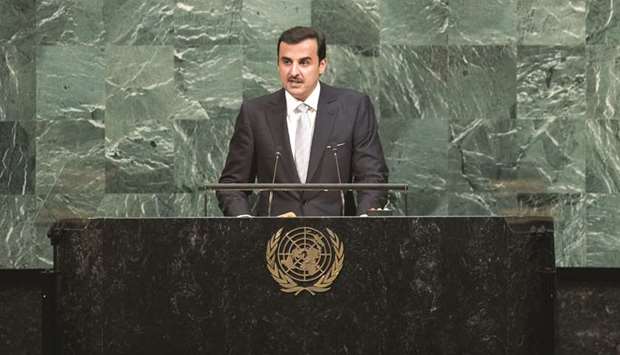Addressing the 72nd Session of the UN General Assembly in New York, His Highness the Emir said the countries that are blockading Qatar are inflicting damage on the “war on terror”.
“The countries who imposed the blockade on the State of Qatar interfere in the internal affairs of many countries, and accuse all those who oppose them domestically and abroad with terrorism. By doing so they are inflicting damage on the war on terror,” Sheikh Tamim said in his speech to the annual gathering of world leaders.
“We have refused to yield to dictations by pressure and siege.”
He said the perpetrators of the QNA hacking have committed an assault against a sovereign State. The crime was deliberately committed for political aims, and was followed by a list of political dictations which contravene sovereignty, and caused worldwide astonishment.
“The State of Qatar is ready to put its potential to serve a joint effort around cyber security and electronic piracy.”
Sheikh Tamim said the countries who imposed the unjust blockade on Qatar have intervened in the internal affairs of the State and ripped apart families to force them to change their political affiliation to destabilise a sovereign country. “Isn’t this one of the definitions of terrorism?” he wondered.
“This illegal blockade was not confined to the economic aspect and the breach of WTO Agreement, but it exceeded that to violate human rights conventions through arbitrary measures that have caused social, economic and religious harm to thousands of citizens and residents of the GCC countries, due to the violation of the basic human rights to work, education, freedom of movement and the right to dispose of private property.”
He said the blockading countries went beyond this and pursued their own citizens and residents by imposing penalties of imprisonment and fines on them for the mere expression of their sympathy with Qatar, even if that was on social media, in a precedent never seen before in the world – in violation of human rights conventions and agreements that guarantee the right of everyone to freedom of opinion and expression of ideas.
“There are countries that permit themselves not only to attack a neighbouring country to dictate its foreign and media policy, but also believe that their possession of funds qualifies them to put pressure on and blackmail other countries to participate in their aggression, while they are supposed to be held accountable internationally for what they have done.”
His Highness the Emir expressed his pride in the Qatari people, along with the multinational and multicultural residents of Qatar. He appreciated the resilience of the Qatari people in confronting the siege, who rejected the dictations with resolve and pride, insisted on the independence of Qatar’s sovereign decision, strengthened its unity and solidarity, and maintained their refined manners and their progress despite the fierceness of the campaign against them and their country.
The Emir thanked the brotherly and friendly countries that recognise the importance of respecting the sovereignty of states and the provisions of international law.
On Qatar’s global role, the Emir said maintaining regional and international peace and security is a priority for the country’s foreign policy.
“Qatar’s principles and objectives are based on the United Nations’ charter and the rules of international legality, which call for constructive co-operation among States, mutual respect and non-interference in internal affairs, good neighbourliness, as well as promoting peaceful co-existence and pursuing peaceful means to settle disputes.
“We emphasise again that the State of Qatar will spare no effort in working to strengthen the role and efforts of the United Nations to achieve what the international community seeks with regard to peace and security, and to promote human rights and advance development.
“Qatar will continue its mediation efforts to find just solutions in conflict zones and will remain, as it has always been known, a safe haven for the oppressed.
“Terrorism and extremism, which are among the most serious challenges facing the world, require a joint confrontation and concerted action against terrorist organisations and their extremist ideology in order to maintain security for humanity and stability for the world.”
It is important to address the social, political and cultural root causes of terrorism and extremism in order to stop terrorism, he said.
The Emir affirmed that the fight against terrorism and extremism was and will continue to be Qatar’s highest priority through its active contributions to regional and international efforts.
“We renew our condemnation of all forms of terrorism and extremism and reject tackling this phenomenon with double standards or by linking to with any particular religion, race, civilization, culture or society.
“The international community must give high priority to the resumption of peace talks on the basis of ending the Israeli occupation of Arab territories and reaching a just and comprehensive and final settlement based on international law and the establishment of an independent Palestinian state on the 1967 borders with Jerusalem as its capital.
The Emir has urged the Palestinians to complete national reconciliation.
He also stressed the need to reach a political solution to the Syrian crisis in a way that meets the aspirations of the Syrian people and maintains the sovereignty of Syria.
Qatar will provide aid to alleviate the sufferings of the Syrian brothers within the framework of the UN, he said.
On Libya, the Emir said concerted efforts are to be taken to support the Government of National Accord in its bid to restore stability in that country.
He extended support to the Iraqi government’s endeavours to achieve stability and unity.
The importance of maintaining Yemen’s unity, security and stability and ending the sufferings of the people through a political solution to the infighting and the war was also stressed.
The Emir renewed his call for conducting a constructive dialogue between the GCC countries and Iran on the basis of common interests, the principles of good neighbourliness, respect for the sovereignty of states and non-interference in their internal affairs.

